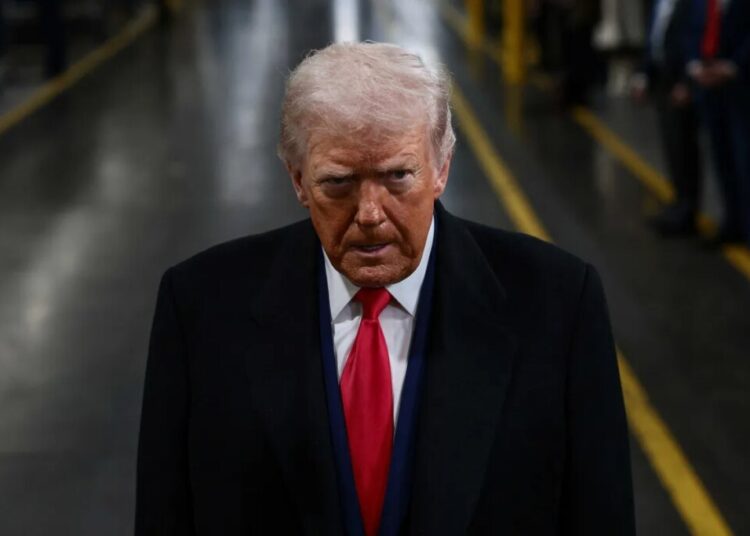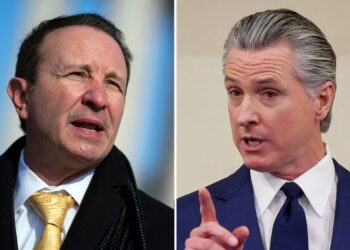In the halls of power in Kyiv, not many are feeling thankful this week. President Donald Trump’s Thanksgiving deadline for Ukraine’s leadership to accept the terms of a potential peace deal with Russia landed like a grenade across the Atlantic.
Ukrainian President Volodymyr Zelensky said his country had to choose between “either the loss of dignity or the risk of losing a key partner” — that is, antagonizing the White House if he balks at the deal. European leaders, many sitting in South Africa at the G-20 summit over the weekend, scrambled to once again muster support for Ukraine in the face of Trump’s pressure.
The 28-point plan put forward by Trump’s team, in apparent consultation with Russian interlocutors, crosses several red lines for Ukraine. It would have Kyiv cede territory to Russia that it has not conquered militarily in the years since its full-fledged invasion in 2022. The plan also mandates that Kyiv scale back the size of its military, rule out hosting NATO troops on its soil and enshrine in its constitution that it would never join the NATO military alliance — all without a significant Western security guarantee for Ukraine.
U.S. officials led by Secretary of State Marco Rubio and Trump special envoy Steve Witkoff are in Geneva for meetings with Zelensky and European counterparts in a bid to smooth over differences. Both sides on Sunday indicated progress toward that end, without going into specifics on revisions to the document.
European Commission President Ursula von der Leyen said in a statement early in the day that Europe didn’t want to see restrictions on Ukraine’s armed forces that would leave it “vulnerable to future attack,” and sought a settlement that would “stop the killing,” while also “not sowing the seeds for a future conflict.” She emphasized the European Union’s commitment to keeping Ukraine on track for membership in the bloc.
Amid Ukrainian and European disquiet, Trump told reporters that the deal wasn’t necessarily a “final offer.” But he spoke bluntly about the need for Zelensky to take the proposal seriously. “He’ll have to like it. And if he doesn’t like it, then they should just keep fighting, I guess,” Trump said Friday. The next day, when speaking again to reporters, Trump said Zelensky could either accept the deal or “continue to fight his little heart out.”
Trump’s rhetoric conveys a deeper impatience. The White House has already pulled back aid to Ukraine, with Europe now providing the lion’s share of assistance. For months, Trump’s eagerness to forge a peace deal has been at odds with both Ukraine’s unwillingness to cede its territory to Russian invaders and Russian President Vladimir Putin’s own questionable interest in engaging in serious negotiations.
But the events of recent days gave European officials the impression that Trump was once again playing into Russia’s hands. “I feel nauseous,” a Kyiv-based diplomat told the Atlantic after attending a briefing with U.S. Army Secretary Dan Driscoll, who formally delivered the 28-point plan to Zelensky in the Ukrainian capital last week. “It’s like the world is shattering around us, and we are watching it in real time.”
Onlookers in the U.S. foreign policy establishment echoed the sentiment. “This is unthinkable for Ukraine and undermines U.S. national security,” noted Bridget Brink, a former U.S. ambassador to Kyiv who is now running for Congress in Michigan as a Democrat, suggesting the potential concessions were on par with European appeasement of the Nazi regime before World War II. “Appeasing dictators never achieves long-term peace. It didn’t work in 1938 — and it won’t work now.”
“This so-called ‘peace plan’ has real problems, and I am highly skeptical it will achieve peace,” Sen. Roger Wicker (R-Mississippi), chairman of the Senate Armed Services Committee, said in a post on X. “Any assurances provided to Putin should not reward his malign behavior or undermine the security of the United States or allies.”
But there are other considerations weighing on the moment. On the front lines, Ukraine is struggling to keep Russia at bay, with Pokrovsk, a strategic logistics and rail hub in the country’s eastern region of Donetsk, on the brink of falling after months of bitter fighting. In Kyiv, an all-the-more damaging corruption scandal has rocked confidence in Zelensky’s government and focused ire on his inner circle, including top adviser Andriy Yermak, who participated in this weekend’s Geneva talks.
Trump’s plan can also be interpreted as something of an off-ramp for both warring parties: It offers Putin a path out of the geopolitical cold, Zelensky a chance to let the Ukrainian people decide the way forward with the promise of elections 100 days after an agreement is signed and amnesty to all Russian and Ukrainian officials over their conduct during the war (including any Zelensky allies).
“What prompted this peace bid,” wrote Post columnist David Ignatius, “was a sense that recent reversals on the battlefield in the Donetsk region and a corruption scandal in Kyiv have brought Ukraine to an inflection point. Russia, meanwhile, is feeling growing economic pressure and might prefer to end the war rather than fight on for the two years that might be necessary to take Donetsk completely.”
While most European leaders signaled a desire to revamp Trump’s plan, one conspicuous head of government cheered it on. “Europeans must immediately and unconditionally support the peace initiative of the United States,” Hungarian Prime Minister Viktor Orban, who has spent months denouncing continued military assistance to Kyiv and urging rapprochement with the Kremlin, wrote in a statement. “In addition to supporting the U.S. President, we must without delay launch autonomous and direct negotiations with Russia.”
Orban is not alone on the continent in wanting a speedy resolution, no matter what that may mean for Ukraine’s sovereignty and future. There’s a burgeoning pro-Russian bloc in the European Parliament, populated by politicians from some of Europe’s ascendant, far-right parties.
Other analysts argue that time is running out for Kyiv to get a better deal. “Given the growing evidence of Ukrainian military weakness and Russian ability to press forward with its offensives, simple prudence dictates the search for an early peace on reasonable terms,” wrote Anatol Lieven of the Quincy Institute, a Washington think tank that advocates foreign policy restraint.
He added that, in years to come, Trump’s deal may not seem like such a bitter pill to have to swallow: “An agreement that leaves three quarters of Ukraine independent and with a path to E.U. membership would in fact be a Ukrainian victory, albeit a qualified one.”
Sign up to receive WorldView, a free, thrice-weekly email newsletter from the international desk of The Washington Post.
The post The case against — and for — Trump’s Ukraine plan appeared first on Washington Post.




